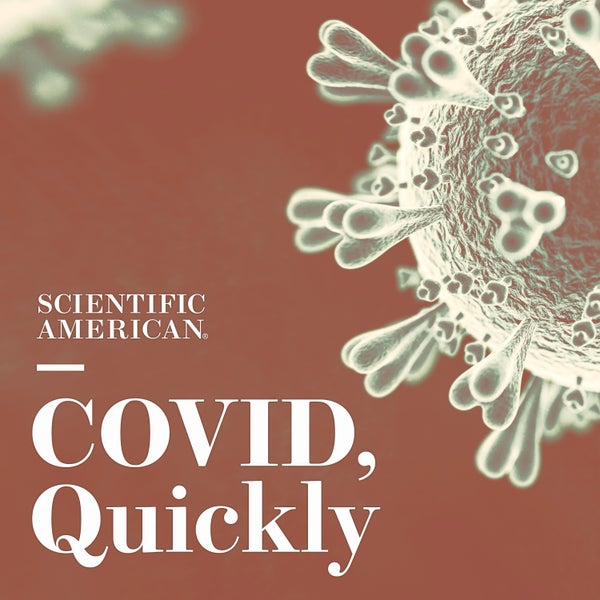Tanya Lewis: Hi, and welcome to COVID, Quickly, a Scientific American podcast series.
Josh Fischman: This is your fast-track update on the COVID pandemic. We bring you up to speed on the science behind the most urgent questions about the virus and the disease. We demystify the research and help you understand what it really means.
Lewis: I’m Tanya Lewis.
On supporting science journalism
If you're enjoying this article, consider supporting our award-winning journalism by subscribing. By purchasing a subscription you are helping to ensure the future of impactful stories about the discoveries and ideas shaping our world today.
Fischman: I’m Josh Fischman.
Lewis: And we’re Scientific American’s senior health editors. Today we’re going to talk about why vaccines are safe for pregnant people, who are at higher risk of severe COVID ...
Fischman: And the arrival of a new COVID antiviral pill that could cut the risk of severe illness.
The CDC strongly recommends that pregnant people get vaccinated against COVID. Yet here in the U.S., few of them have. And that’s creating a dangerous situation for both parents and babies.
Lewis: That’s right, Josh. Only about a third of pregnant people in the country have gotten their COVID shots, despite a growing pile of evidence that they are not only safe during pregnancy, but may save the parent’s and baby’s life. Freelancer Mariana Lenharo reported on some of this research for SciAm earlier this week.
Studies now show that pregnant people who get COVID are more likely to be hospitalized. One study that compared pregnant people with and without COVID found that those with the disease had a higher risk of preeclamspia—a form of high blood pressure—and preterm birth. Furthermore, pregnant people with COVID were five times more likely to be admitted to an ICU and 22 times more likely to die than those without COVID.
The risk increases with the number of underlying health conditions, such as obesity or high blood pressure. And the Delta variant makes things worse. The CDC reported that a total of 161 COVID deaths had occurred in pregnant women as of late September, 22 of them in August alone. Lenharo talked to Romeo Galang, an obstetrician-gynecologist at the CDC. He said this number “represents the highest number of deaths [in pregnant individuals] in a single month of the pandemic.”
The good news is, the vaccines are safe for pregnant people. An analysis of more than 3,900 pregnant people who got vaccinated found that they did not have higher rates of miscarriages, birth defects or preterm births than those who were unvaccinated. Another study of more than 2,000 vaccinated pregnant people also showed they had no increased risk to their babies. And contrary to some claims, the vaccines do not affect fertility (although COVID itself might).
The CDC now strongly recommends vaccination either before or during pregnancy, saying the benefits outweigh the risks for both the parent and baby. So, if you’re pregnant or thinking about getting pregnant, now’s the time to roll up those sleeves!
Now we’re at a part of the show when, every few episodes, I get Josh to pronounce a complicated drug name. Ready, Josh?
Fischman: Bring it on, Tanya.
Lewis: OK, go for it.
Fischman: It’s MOL-NU-PEER-AVIR. Molnupiravir. How’d I do?
Lewis: Sounded good to me. Now: can you explain what it does against COVID?
Fischman: It’s a pill, and it may keep some at-risk people from getting severely sick and dying, if they take it soon after they are infected. There was a cascade of headlines about the drug last weekend. Merck, the drug company that owns rights to the pill, put out a press release. It said that in people with at least one COVID risk factor, such as being over 65, molnupiravir cut the likelihood of hospitalization and death from about 14 percent to about 7 percent. Basically it cut that danger in half.
Now this was a press release, and the FDA has to review the data. And it will, because the company says it’s going to apply for emergency FDA authorization for use.
What could be a big deal is that this is a pill. Into the mouth and swallow, twice a day for five days. Other treatments, like monoclonal antibodies, have to be infused into your veins or injected, which makes them hard to give outside of a hospital. A pill will be easier to give to sick people all over the world, or easier to get at your local CVS.
I want to point out one thing. Merck, and collaborator Ridgeback Biotherapeutics, didn’t invent this pill. It came from university researchers working on an NIH grant. Scientists at Emory University, Vanderbilt University, and the University of North Carolina were the ones who figured out the drug could muck up the virus’s ability to make copies of itself.
That stops an infection from getting worse. In lab experiments, the drug appears to work against several variants, too. So if the drug does end up helping people, it’s a win not just for patients. It also shows the power of basic research and the tax dollars that support it.
Lewis: Now you’re up to speed. Thanks for joining us.
Fischman: Come back in two weeks for the next episode of COVID, Quickly! And check out SciAm.com for updated and in-depth COVID news.
[The above text is a transcript of this podcast.]

